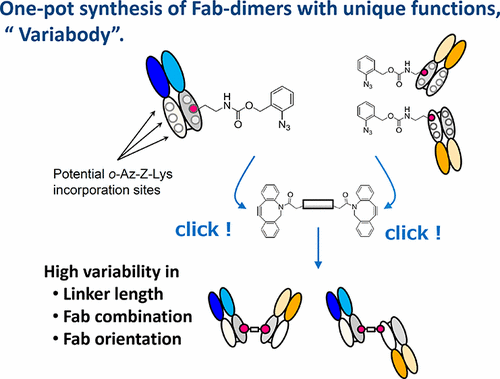当前位置:
X-MOL 学术
›
Bioconjugate Chem.
›
论文详情
Our official English website, www.x-mol.net, welcomes your
feedback! (Note: you will need to create a separate account there.)
Extensive Survey of Antibody Invariant Positions for Efficient Chemical Conjugation Using Expanded Genetic Codes
Bioconjugate Chemistry ( IF 4.0 ) Pub Date : 2017-07-20 00:00:00 , DOI: 10.1021/acs.bioconjchem.7b00265 Akifumi Kato , Mitsuo Kuratani 1, 2 , Tatsuo Yanagisawa 1, 2 , Kazumasa Ohtake 2, 3 , Akiko Hayashi 2, 3 , Yoshimi Amano 3 , Kaname Kimura , Shigeyuki Yokoyama 1, 2 , Kensaku Sakamoto 2, 3 , Yasuhisa Shiraishi
Bioconjugate Chemistry ( IF 4.0 ) Pub Date : 2017-07-20 00:00:00 , DOI: 10.1021/acs.bioconjchem.7b00265 Akifumi Kato , Mitsuo Kuratani 1, 2 , Tatsuo Yanagisawa 1, 2 , Kazumasa Ohtake 2, 3 , Akiko Hayashi 2, 3 , Yoshimi Amano 3 , Kaname Kimura , Shigeyuki Yokoyama 1, 2 , Kensaku Sakamoto 2, 3 , Yasuhisa Shiraishi
Affiliation

|
The site-specific chemical conjugation of proteins, following synthesis with an expanded genetic code, promises to advance antibody-based technologies, including antibody drug conjugation and the creation of bispecific Fab dimers. The incorporation of non-natural amino acids into antibodies not only guarantees site specificity but also allows the use of bio-orthogonal chemistry. However, the efficiency of amino acid incorporation fluctuates significantly among different sites, thereby hampering the identification of useful conjugation sites. In this study, we applied the codon reassignment technology to achieve the robust and efficient synthesis of chemically functionalized antibodies containing Nε-(o-azidobenzyloxycarbonyl)-l-lysine (o-Az-Z-Lys) at defined positions. This lysine derivative has a bio-orthogonally reactive group at the end of a long side chain, enabling identification of multiple new positions in Fab-constant domains, allowing chemical conjugation with high efficiency. An X-ray crystallographic study of a Fab variant with o-Az-Z-Lys revealed high-level exposure of the azido group to solvent, with six of the identified positions subsequently used to engineer “Variabodies”, a novel antibody format allowing various connections between two Fab molecules. Our findings indicated that some of the created Variabodies exhibited agonistic activity in cultured cells as opposed to the antagonistic nature of antibodies. These results showed that our approach greatly enhanced the availability of antibodies for chemical conjugation and might aid in the development of new therapeutic antibodies.
中文翻译:

使用扩展的遗传密码对有效化学缀合的抗体不变位置进行广泛的调查
在合成具有扩展遗传密码的蛋白质之后,蛋白质的位点特异性化学偶联有望促进基于抗体的技术的发展,包括抗体药物偶联和双特异性Fab二聚体的产生。将非天然氨基酸掺入抗体不仅可以保证位点特异性,还可以使用生物正交化学。但是,氨基酸掺入的效率在不同位点之间显着波动,从而妨碍了对有用的缀合位点的鉴定。在这项研究中,我们应用了密码子重新分配技术实现包含化学官能化抗体的健壮和有效的合成Ñ ε - (ö -azidobenzyloxycarbonyl) -升-赖氨酸(o -Az-Z-Lys)在定义的位置。该赖氨酸衍生物在长侧链的末端具有一个生物正交的反应基团,能够识别Fab恒定域中的多个新位置,从而实现高效的化学缀合。为Fab变体与所述的X射线结晶研究ö-Az-Z-Lys揭示了叠氮基团在溶剂中的大量暴露,其中六个确定的位置随后被用于工程化“变异体”,这是一种新颖的抗体形式,允许两个Fab分子之间进行各种连接。我们的发现表明,与抗体的拮抗性质相反,一些创建的可变抗体在培养的细胞中表现出激动活性。这些结果表明,我们的方法大大提高了化学偶联抗体的可用性,并可能有助于开发新的治疗性抗体。
更新日期:2017-07-20
中文翻译:

使用扩展的遗传密码对有效化学缀合的抗体不变位置进行广泛的调查
在合成具有扩展遗传密码的蛋白质之后,蛋白质的位点特异性化学偶联有望促进基于抗体的技术的发展,包括抗体药物偶联和双特异性Fab二聚体的产生。将非天然氨基酸掺入抗体不仅可以保证位点特异性,还可以使用生物正交化学。但是,氨基酸掺入的效率在不同位点之间显着波动,从而妨碍了对有用的缀合位点的鉴定。在这项研究中,我们应用了密码子重新分配技术实现包含化学官能化抗体的健壮和有效的合成Ñ ε - (ö -azidobenzyloxycarbonyl) -升-赖氨酸(o -Az-Z-Lys)在定义的位置。该赖氨酸衍生物在长侧链的末端具有一个生物正交的反应基团,能够识别Fab恒定域中的多个新位置,从而实现高效的化学缀合。为Fab变体与所述的X射线结晶研究ö-Az-Z-Lys揭示了叠氮基团在溶剂中的大量暴露,其中六个确定的位置随后被用于工程化“变异体”,这是一种新颖的抗体形式,允许两个Fab分子之间进行各种连接。我们的发现表明,与抗体的拮抗性质相反,一些创建的可变抗体在培养的细胞中表现出激动活性。这些结果表明,我们的方法大大提高了化学偶联抗体的可用性,并可能有助于开发新的治疗性抗体。











































 京公网安备 11010802027423号
京公网安备 11010802027423号